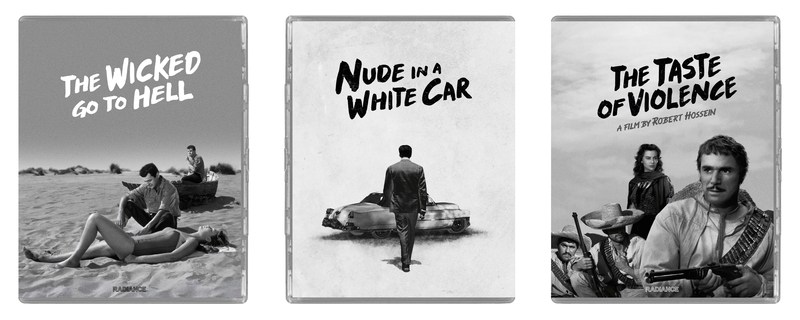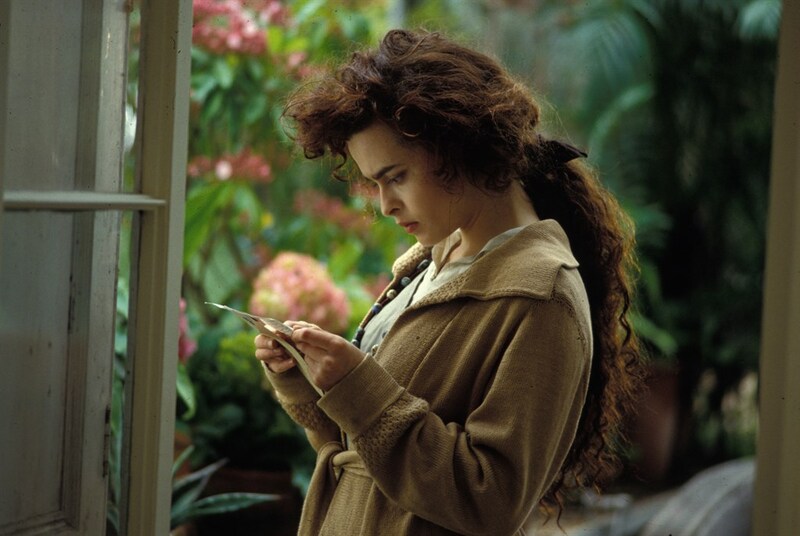
A Showcase of Style, Tension, and Tragedy
MOVIE REVIEW
Wicked Games: Three Films by Robert Hossein (LE)
–
Genre: Film Noir, Crime, Western, Thriller
Year Released: 1955–1961, 2025 Radiance Films
Runtime: 4h 28m
Director(s): Robert Hossein
Writer(s): Frédéric Dard (The Wicked Go to Hell, Nude in a White Car), Robert Hossein, additional collaborators per film
Cast: Robert Hossein, Marina Vlady, Henri Vidal, Serge Reggiani, Odile Versois, Giovanna Ralli, Mario Adorf, Hans H. Neubert, Charles Blavette
Where to Watch: available now, order your copy here: www.radiancefilms.co.uk, www.mvdshop.com, or www.amazon.com
RAVING REVIEW: WICKED GAMES: THREE FILMS BY ROBERT HOSSEIN is the kind of box set that shifts how you view a specific filmmaker. Before these restorations, Hossein was often treated as a stylist lurking in the margins of French cinema — admired by enthusiasts, overlooked by the mainstream. But presented together, cleaned up, and paired with modern extras galore, these three films reveal just how distinct and sharp his work truly was. Across noir, mystery, and a proto–Zapata Western, Hossein displays a consistent fascination with guilt, temptation, loyalty, and the fragile spaces between violence and desire.
The first film, THE WICKED GO TO HELL, sets the tone with its prison-break premise. On the surface, it plays like a tense crime thriller, complete with an escape plan, desperation, and an uneasy alliance between two inmates. But the deeper you get into it, the more you notice how Hossein pushes away from simple genre cliches. The prison becomes less a setting and more a pressure chamber where paranoia and suspicion feed off each other. The rumor that one inmate betrayed a third man before his execution is a small spark, but Hossein treats it like a fuse that threatens the entire narrative. Henri Vidal and Serge Reggiani play their roles with worn, exhausted intensity, and once the escape leads them to the remote cabin, the film shifts into a more fatalistic noir mood. Marina Vlady’s presence adds tension rather than relief — her character is treated not as an object of rescue or romantic fantasy, but as another unpredictable element in a world where people reveal only what survival requires.
This instability, the sense that alliances are only temporary shelters against guilt and fear, becomes one of the strongest themes running through all three films. Hossein seems to be searching for what happens to people when they’re forced to navigate a landscape where trust is both vital and dangerous. That approach deepens the experience without turning the film into a moral commentary. Instead, the atmosphere does most of the work: close quarters, quiet moments broken by violence, and a feeling that the characters’ past sins never stop circling them.
The second film, NUDE IN A WHITE CAR, is a dramatic shift in tone but not in fixation. What begins as an intoxicating erotic encounter — an anonymous blonde inviting a stranger into a car for a fleeting moment of desire — quickly becomes a mystery rooted in longing, delusion, and the tension between fantasy and reality. Hossein himself plays Pierre, the story's central figure. His performance is restrained but constantly flickering with curiosity and danger. When he tries to uncover the identity of the mysterious woman, the narrative splits in noir fashion: two sisters, one who claims never to leave the house and another who can’t walk, both wrapped in shadows and careful emotional distance.
Hossein uses the structure not for twists but for textures — dimly lit rooms, hushed conversations, unspoken motives. The film leans heavily on mood, but it never drifts into emptiness. Instead, the mystery layers itself through Pierre’s need to understand what happened in that car, why it matters, and what he hopes it will lead to. This isn’t the kind of noir about criminals plotting or detectives investigating; it’s about the unsteady, often irrational pull of desire and the lengths someone will go to make sense of an encounter that feels unreal. The aesthetic choices — lingering silhouettes, deliberate pacing, and intensity — create a hypnotic effect. Hossein’s collaboration with Frédéric Dard shows how well they understood the emotional undercurrent of noir: the idea that longing is dangerous, and attraction can be a trap.
The third film, THE TASTE OF VIOLENCE, is both the most ambitious and the most expansive of the set. The shift to a Latin American revolutionary setting gives the film a wider canvas, and Hossein fills it with moral ambiguity. Playing the revolutionary leader Perez, he captures the conflict of a man whose cause demands sacrifice, violence, and unwavering resolve. The kidnapping of a dictator’s daughter becomes the centerpiece of the narrative, but the film treats it not as a spectacle but as an opportunity to explore changing loyalties. Giovanna Ralli brings a strength to her character that anchors the film’s emotional stakes. At the same time, Mario Adorf provides the charisma and unpredictability needed for a story built on the idea that ideals are far easier to champion than to uphold.
The most striking thing about this film is its visual identity. The landscapes are harsh and sweeping, the lighting dramatic, and the action tight without being sensationalized. You can feel the early DNA of what would become the Zapata Western — a blending of political conflict, personal struggle, and the inevitability of violence. Hossein treats the premise with seriousness, never leaning on simple heroism. Instead, he reveals the pressures that drive people to betray their causes, question their loyalties, or cling to hope in impossible conditions. The film’s ending, while inevitable, avoids melodrama, leaning instead into the idea that revolutions are never as clean or righteous as they’re portrayed.
As a collection, WICKED GAMES works because the films speak to each other even though they span different genres. You see Hossein refining his approach to character intimacy, tension, and thematic weight. He returns repeatedly to moments where people are forced into moral corners — not because they seek power, but because circumstances have left them with only difficult choices. This throughline makes the set feel cohesive without the films needing to mirror each other formally.
The restorations highlight Hossein’s visual instincts. Clean lines, sharp compositions, and careful use of shadow show how much his work benefited from preservation. The bonus features further deepen appreciation, offering context for his collaborations, influences, and the evolution of his style. The interviews and visual essays make it clear that Hossein approached tone and framing intentionally, especially in how he used silence and stillness to build emotional impact. WICKED GAMES is more than a rediscovery — it’s a reintroduction. These films showcase a director who understood genre not as a limitation but as a foundation to build upon. Whether through claustrophobic, seductive, or political stories, Hossein crafted narratives that lived in the space between fear, desire, and consequence. This set is a gift to film preservation fans, noir enthusiasts, and anyone who appreciates emotionally grounded genre filmmaking. Each film stands on its own, but together they reveal an artist whose work deserves to be talked about far more widely.
Bonus Materials:
LIMITED EDITION BOX SET SPECIAL FEATURES:
2K restorations by Gaumont for each film, presented on three discs
Original uncompressed mono audio for each film
Audio commentary on each film by critic and author Tim Lucas (2025)
Picking Strawberries – A newly created ‘making of’ featurette with historian Lucas Balbo, featuring archive interviews with Hossein and Jean Rollin (2025)
Behind Marked Eyes: The Cinematic Stare of Robert Hossein – A newly created featurette by Howard S. Berger about Hossein and his work (2025)
Interview with actor Marina Vlady (2014)
The Evolution of the Femme Fatale in Classic French Cinema – A visual essay by critic Samm Deighan (2025)
The Taste of Violence appreciation by filmmaker and Western authority Alex Cox (2025)
Interview with author C. Courtney Joyner on The Taste of Violence and the Zapata Western subgenre (2025)
Trailers
Reversible sleeves featuring original and newly commissioned artwork by Time Tomorrow
Limited edition booklet featuring new writing by Walter Chaw and newly translated archival writing by Lucas Balbo
Limited Edition of 3000 copies, presented in a rigid box with full-height Scanavo cases and removable OBI strip, leaving packaging free of certificates and markings
Please visit https://linktr.ee/overlyhonestr for more reviews.
You can follow me on Letterboxd, Instagram, Twitter, and YouTube. My social media accounts can also be found on most platforms by searching for 'Overly Honest Reviews'.
I’m always happy to hear from my readers; please don't hesitate to say hello or send me any questions about movies.
[photo courtesy of RADIANCE FILMS, MVD ENTERTAINMENT]
DISCLAIMER:
At Overly Honest Movie Reviews, we value honesty and transparency. Occasionally, we receive complimentary items for review, including DVDs, Blu-rays, CDs, Vinyl Records, Books, and more. We assure you that these arrangements do not influence our reviews, as we are committed to providing unbiased and sincere evaluations. We aim to help you make informed entertainment choices regardless of our relationship with distributors or producers.
Amazon Affiliate Links:
Additionally, this site contains Amazon affiliate links. If you purchase through these links, we may receive a commission. This affiliate arrangement does not affect our commitment to honest reviews and helps support our site. We appreciate your trust and support as you navigate these links.



Average Rating